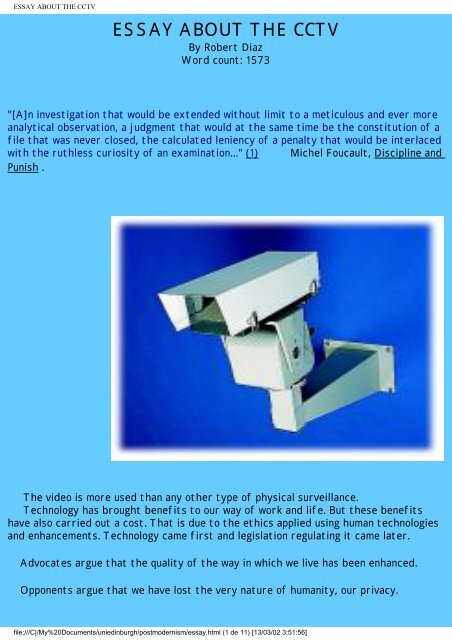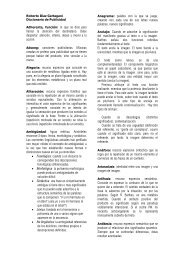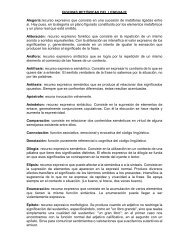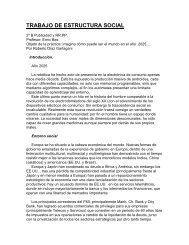ESSAY ABOUT THE CCTV - gartagani
ESSAY ABOUT THE CCTV - gartagani
ESSAY ABOUT THE CCTV - gartagani
You also want an ePaper? Increase the reach of your titles
YUMPU automatically turns print PDFs into web optimized ePapers that Google loves.
<strong>ESSAY</strong> <strong>ABOUT</strong> <strong>THE</strong> <strong>CCTV</strong><br />
<strong>ESSAY</strong> <strong>ABOUT</strong> <strong>THE</strong> <strong>CCTV</strong><br />
By Robert Diaz<br />
Word count: 1573<br />
"[A]n investigation that would be extended without limit to a meticulous and ever more<br />
analytical observation, a judgment that would at the same time be the constitution of a<br />
file that was never closed, the calculated leniency of a penalty that would be interlaced<br />
with the ruthless curiosity of an examination..." (1) Michel Foucault, Discipline and<br />
Punish .<br />
The video is more used than any other type of physical surveillance.<br />
Technology has brought benefits to our way of work and life. But these benefits<br />
have also carried out a cost. That is due to the ethics applied using human technologies<br />
and enhancements. Technology came first and legislation regulating it came later.<br />
Advocates argue that the quality of the way in which we live has been enhanced.<br />
Opponents argue that we have lost the very nature of humanity, our privacy.<br />
file:///C|/My%20Documents/uniedinburgh/postmodernism/essay.html (1 de 11) [13/03/02 3:51:56]
<strong>ESSAY</strong> <strong>ABOUT</strong> <strong>THE</strong> <strong>CCTV</strong><br />
Postmodernity means in this case the Information Era. In those technologies, we<br />
included Artificial Intelligence, computers, telematics and video cameras (<strong>CCTV</strong>). It<br />
is interesting to isolate first the key features of the Jeremy Bentam’s Panopticon.<br />
After this first approach, we will consider the relation betwee this model and the rules<br />
of the <strong>CCTV</strong>s in the modern city and societies.<br />
- The Panopticon is a regulative dysotopia.<br />
- There is something sinister.<br />
- It is a way to internalise social rules on behalf of the citizen. An<br />
“anticipatory conformity” with those rules.<br />
In the original Bentham’s book he describes his invention and the effect of the<br />
permanent control as: “ You will please to observe, that though perhaps it is the most<br />
important point, that the persons to be inspected should always feel themselves as if<br />
under inspection, at least as standing a great chance of being so, yet it is not by any<br />
means the only one.(...)What is also of importance is, that for the greatest proportion<br />
of time possible, each man should actually be under inspection.(...)Not only so, but the<br />
greater chance there is, of a given person's being at a given time actually under<br />
inspection, the more strong will be the persuasion - the more intense, if I may say so,<br />
the feeling, he has of his being so”.(2)<br />
A real example of the Panopticon in a USA's prison.<br />
In the modern Psychology the socialisation process comprises the interiorization on<br />
behalf of the individual of the social rules. This point obviously cannot be skipped. Also<br />
it supposed an influence (of the the Panopticon device) on the individual. But the<br />
file:///C|/My%20Documents/uniedinburgh/postmodernism/essay.html (2 de 11) [13/03/02 3:51:56]
<strong>ESSAY</strong> <strong>ABOUT</strong> <strong>THE</strong> <strong>CCTV</strong><br />
“influence” means a learned change in behaviour due to a change in the attitude, by a<br />
previous change in the perception of the society or the reality.<br />
But by using this sort of devices from the individual point of view, the change has not<br />
been done: the interiorization process does not exist. The change has not been<br />
motivated. It is forced by the power of the authority. To talk seriously about<br />
“influence” we must not talk only about submission, but also about gratitude and<br />
appreciation. Of course, that must be a voluntary act. This does not mean the same<br />
influence than coercion in this case to understand plenty the socialisation process. In<br />
this case, we must distinguish between “influence”, “authority” and “power”. (3)<br />
Perhaps a deeper understanding of the power and the meaning of cognitive<br />
dissonance was the main failure in Bentham´s thought. For Foucault the Panopticon<br />
was a potent metaphor for what he most despised about modern society. Now, instead<br />
the prison we must consider another sphere for <strong>CCTV</strong> surveillance: public spaces.(4)<br />
Picture: a download image taken in New York's 5th Avenue.<br />
Also this metaphor includes a general paradigm for the functioning of the modern<br />
power. We must consider a taxonomical study of the power in his last essence (the<br />
Foucault’s analysis). We are talking about a continuous visibility (of the controlled<br />
person) and some questions can arise:<br />
- Does it expect a self-subjection of the citizen?<br />
- Does that create a cognitive dissonance further than an interiorization of<br />
file:///C|/My%20Documents/uniedinburgh/postmodernism/essay.html (3 de 11) [13/03/02 3:51:56]
<strong>ESSAY</strong> <strong>ABOUT</strong> <strong>THE</strong> <strong>CCTV</strong><br />
the “correct” behaviour?<br />
How the crowd has change in the new era with the communications and what about<br />
the terrorism, offences or the excluded that creates this system? (5)<br />
From the structure (the government) are a lot of potential dangers. More control<br />
means more stability to social life. But “stability” is bad for some social classes and<br />
good for others. Public control by <strong>CCTV</strong>s seems to be a good enough idea in theory, but<br />
the reality of surveillance is a different story. The UK legislation does try to protect<br />
our privacy, however loopholes and lack of regulation mean abuse.(6) The solution in this<br />
case means full implementation of Article 8 of the European Convention of Human<br />
Rights: otherwise our privacy cannot be guaranteed.<br />
From the citizen’s point of view there is more, because the end of the “individuality”<br />
means totalitarism, and we must think in this sort of idea: to be continuously monitored<br />
by the eye of the system. The general public does not understand the wide use of this<br />
technology.<br />
The current digital advancements have made possible an astonishing array of<br />
capabilities. But, what about the developments in technology?<br />
Certainly it has been absolutely amazing in these last years. Not only by the<br />
availability of the technology but by its cost: even private enterprises can access this<br />
technology for a low cost.<br />
[The hardware required is usually around the following: 500MHz PIII, 128 MB RAM,<br />
10Gb hard disk, a video capture card, and a camera]. (7)<br />
Advancements in Artificial Intelligence and OCR have been incredible. In fact,<br />
rather than a large outlay in expensive for dedicated hardware, a <strong>CCTV</strong> system with<br />
facial recognition (from a database, accessible within 3 seconds), can be set up using a<br />
typical desktop computer running Windows<br />
With the new technologies it becomes possible to cover a large area with located<br />
operators reporting to a central location.<br />
So there are two interesting points with the technology:<br />
- Due to the modern network links (fibre optic, ADSL, wireless networking,<br />
etc) data can be sent to the control center and be processed quickly.<br />
- The modern recognition system also means that the main characteristics<br />
of the human’s face are stored in a “usable size”, which means a size to be<br />
processed very fast by computers in order to allow the artificial human<br />
file:///C|/My%20Documents/uniedinburgh/postmodernism/essay.html (4 de 11) [13/03/02 3:51:56]
<strong>ESSAY</strong> <strong>ABOUT</strong> <strong>THE</strong> <strong>CCTV</strong><br />
recognition.<br />
recognised.<br />
The modern cameras have astonishing capabilities: even in the darkness a person can be<br />
With the automated technologies a single person can be recognised and tracked by<br />
the surveillance system through a crowd of thousands of people. With the proper<br />
software, an operator must only select the person to be followed. (8)<br />
From the government’s point of view, the use of <strong>CCTV</strong> could reduce the costs made<br />
to covering police and produce savings. There is also evidence that CCVT reduce crime,<br />
but from the criminological point of view only small crimes and robberies: the irrational<br />
crime and the crime with violence can not be reduced with those devices. In some cases<br />
<strong>CCTV</strong> cameras have been useful to catch criminals and in less cases there were<br />
mistakes with the criminal to be arrested. This device is only a deterrent to criminals,<br />
it does not change by their minds.<br />
There is never to be a balance in the opinions about <strong>CCTV</strong> cameras. Which point has<br />
the priority? The self-feeling of security changes with people. From the Criminology<br />
Science point of view we can talk about objective or subjective security. The objective<br />
level of security is known by the political authorities and managers of the public<br />
security. The subjective concept is an image of the reality in each mind of the mass, a<br />
self-perception. Therefore at this point there can not be any kind of trust about the<br />
use of <strong>CCTV</strong>.<br />
There is a conflict between the right to privacy and the public security interest.<br />
Privacy and surveillance can not exist at the same time. Clearly, the legality of <strong>CCTV</strong> is<br />
file:///C|/My%20Documents/uniedinburgh/postmodernism/essay.html (5 de 11) [13/03/02 3:51:56]
<strong>ESSAY</strong> <strong>ABOUT</strong> <strong>THE</strong> <strong>CCTV</strong><br />
in doubt. In which point we are talking about a technological paranoia and total<br />
surveillance society? It is very difficult to draw the line.<br />
In my opinion <strong>CCTV</strong> is necessary to detect criminal and terrorist activities between<br />
the crowds in the big city centers, but a ethical use of those devices must be done,<br />
otherwise we can live in a sort of enforced order, absolutely giving the back any social<br />
trust which indicates an advanced society. That happens because this policy (<strong>CCTV</strong>)<br />
works as a deterrent for criminals in the short term, for specifical offences (property<br />
robberies for example) and can not act in the social and human roots of the problem.<br />
On the other hand, offences are the result of the modern way of life, our system and<br />
our cities as another social interaction and not exactly a social pathology. (9)<br />
It makes no sense to use those devices in small villages or cities. The use of those<br />
devices must be justified by the security of thousands of people or historical buildings.<br />
Only in a few cases is justified (in some private spaces and in the center of big cities if<br />
we are talking about public areas). Unluckily, in UK we have seen a spectacular growth<br />
of <strong>CCTV</strong> systems, more than any other country of Europe.<br />
Has the electronic industry marketing interests in this case? For example, the Home<br />
Office has spent last year close to £50 million on <strong>CCTV</strong> installation in town centres.<br />
Also the council’s budget for these purposes has been increased (example, Bradford,<br />
England) (10)<br />
An automatic recognition done by special software and the capability of the<br />
hardware to store millions of data in small folders and report exactly about our<br />
movements at least is a scarring question. It is exactly the end of the privacy. The<br />
availability of the technology for the private’s enterprises with low costs breaks also<br />
the right of privacy, because the data can be used for non-security purposes<br />
(marketing research, etc). The use of software for facial recognition should not be<br />
allowed for private purposes (to be used with <strong>CCTV</strong> systems).<br />
The technology can not be bad, we must bear in mind that only the ethics and the<br />
way in which they are used those devices in our lives and in our society is the main<br />
matter to be discussed. For example: the Autoscopics is a useful technical achieving<br />
improvements in Psychosocial and Educational Sciences. Also the OCR technology is<br />
essential in the industry chains mainly for the packaging and control of quality: release<br />
humans from a hard work: in this case it is a contribution to the public health.(11)<br />
February 2002<br />
file:///C|/My%20Documents/uniedinburgh/postmodernism/essay.html (6 de 11) [13/03/02 3:51:56]
<strong>ESSAY</strong> <strong>ABOUT</strong> <strong>THE</strong> <strong>CCTV</strong><br />
(1) Foucault, Michel,(2000) Discipline and punish, 21st Century Publishers,Madrid,Spain, page<br />
230 In original Spanish says: (...)un interrogatorio que no tuviera término, una<br />
investigación que se prolongara sin límite en una observación minuciosa y cada vez más analítica, un<br />
juicio que fuese al mismo tiempo la constitución de un expediente jamás cerrado, la benignidad<br />
calculada de una pena que estaría entrelazada a la curiosidad encarnizada de un examen(...).<br />
(2) This particular text is available on the web hosted by www.cartome.org . There are a collection of<br />
letter wrote by Bentham, and published in this site. Those are statements appeared on the Letter<br />
number 5, the essential points of the plan: http://cartome.org/panopticon2.htm. In this case the<br />
original source was: Bentham, Jeremy The Panopticon Writings. Ed. Miran Bozovic (London: Verso,<br />
1995). p. 29-95. The Bentham project (hosted by University College London) has on<br />
the web also an interesting array of Bentham's texts this site: www.ucl.ac.uk/Bentham-<br />
Project/index.htm .<br />
(3) There is in internet an essay considering this question: Aldama García, Galindo, 2000, “Las ideas de<br />
Vigotsky y sus aportaciones a la educación” (“The Vigotsky’s ideas and his contribution to the<br />
education”, it is wroten in Spanish language), Mexico, Open University,<br />
http://www.universidadabierta.edu.mx/Biblio/A/Aldama%20Galindo-Vigotsky.htm . Regard to this<br />
point, as says this author, to accept social rules and its interiorización implicate some kind of self<br />
dialectic, a simple copy in the behaviour taken from the reality it is not an internalization:“la<br />
reproducción o copia psíquica de la realidad externa se opone al concepto de interiorización. (…)<br />
Supone un cambio interno a través de una dialéctica y tiene como fruto un proceso psicológico superior.<br />
“<br />
(4) Now the cameras at the prisons are more than a control device. It become in a sort of public<br />
spectacle. See Mieszkowki, Katharine;2001, Nowhere left to hide, San Francisco CA (USA),<br />
www.salon.com/tech/feature/2001/06/18/webcam_privacy/index1.htm .<br />
(5) Privacy International, 2002, Video surveillance, www.privacy.org/pi/issues/cctv/index.html.<br />
file:///C|/My%20Documents/uniedinburgh/postmodernism/essay.html (7 de 11) [13/03/02 3:51:56]
<strong>ESSAY</strong> <strong>ABOUT</strong> <strong>THE</strong> <strong>CCTV</strong><br />
(6) There is a very interesting case judged in the European Court of Human Rights: Sultan Khan versus<br />
United Kingdom, held unanimously that there has been violations of Article 8 (“right to rescpect for<br />
privaty and family life”) of the European Convention for Human Rights. Avalilable in the follow address<br />
hosted by spy organization UK: www.spy.org.uk/wtwu.htm .<br />
(7) C3 Group *, 2001, What is <strong>CCTV</strong>?,DeMonfort University,Leicester (UK),<br />
http://www.ccsr.cse.dmu.ac.uk/sara/assign/d1/tech.html<br />
*The C3 Group are: Rachel Hall, Mathew McNally, David Smith, Rachel Stevens, James Wheatly, Paul<br />
Whiffin, Daniel Withacombe. The C3 Group Report has published a report based on the findings<br />
gathered from research carried out in the area of surveillance under the instructions given by<br />
DeMonfort University, Leicester (UK).<br />
(8) Méndez P. Nelson. (1996). State, Capitalism and social control surveillance technologies. Caracas<br />
University (Venezuela). www.galeon.com/pandemonium/biblio/27panoptico.html . This essay is written<br />
in Spanish. Is a historical review and a political consideration of the surveillance and social control<br />
technologies of the 20 th century.<br />
(9) Sozzo Máximo.(2000) ¿Hacia la Superación de la Táctica de la Sospecha? Notas sobre Prevención<br />
del Delito e Institución Policial. Buenos Aires (Argentina).<br />
www.policiaysociedad.org/Publicaciones/CuadernoCED-CELS01.htm . Published in Spanish.<br />
(10) Bradford council’s budget has been increased continously, also with other external funds, e.g.:<br />
Crime and Disorder Reduction Strategy to develop a better district-wide co-ordination of town centre<br />
and city centre <strong>CCTV</strong> schemes and to examine ways of linking other <strong>CCTV</strong> installations such as those<br />
at the Bradford Interchange and local railway stations: has been spent arround £1.3 million plus<br />
external contributions (1999),<br />
http://www.bradford.gov.uk/council/crimeaudit/strategy/action_plans/fear_4g.html . Other<br />
expenses in <strong>CCTV</strong> system can be found in<br />
www.bradford.gov.uk/council/crimeaudit/strategy/action_plans with the total amount of the crime<br />
reducing an cctv expenses. Also for e.g., BBC (10 th May 2001) reports in http://www.bbc.co.uk/cgibin/education/betsie/parser.pl<br />
: “Closed Circuit Television (<strong>CCTV</strong>) is to be installed in parts of<br />
Bradford thanks to a funding package from the Home Office worth more than £750,000”.<br />
Acording to C3 group in his Report of Tecnologies of surveillance: “(…) The home office last year<br />
spent £50 million on <strong>CCTV</strong> instalation in town cetres in various locations arround the country (UK),<br />
(Cosmopolitan magazine, 2001)”, page number 9, item 6.2., available in this adress:<br />
http://www.ccsr.cse.dmu.ac.uk/sara/assign/c3/Templates/report.htm . But last data in Britain<br />
according to Privacy International in his web page called “video surveillance”, www.privacy.org/pi : “In<br />
the past decade, the use of Closed Circuit Television (<strong>CCTV</strong>) for surveillance and crime control has<br />
file:///C|/My%20Documents/uniedinburgh/postmodernism/essay.html (8 de 11) [13/03/02 3:51:56]
<strong>ESSAY</strong> <strong>ABOUT</strong> <strong>THE</strong> <strong>CCTV</strong><br />
grown to unprecedented levels. In Britain between 150 and 300 million pounds (225 - 450 million<br />
dollars) per year is now spent on a surveillance industry involving an estimated 300,000 cameras<br />
covering shopping areas, housing estates, car parks and public facilities in great many towns and cities.<br />
“<br />
(11) See the Giancarlo Albano’s page: “Las camaras inteligentes y sus aplicaciones”,<br />
http://neutron.ing.ucv.ve/revista-e/No6/Albano%20Giancarlo/CAMARAS.htm , Simon Bolivar<br />
University, Caracas, Venezuela. The original text is in Spanish, but there is an abstract in English. In<br />
this article, the operation, algorithms and technologies used in Smart Cameras are explained in a brief<br />
manner, as well as some of their possible applications and finally the future of the Smart Cameras and<br />
their impact in our society. Albano explain how <strong>CCTV</strong> are useful in some industries and chains.<br />
BIBLIOGRAPHY<br />
The last access to those pages has been done on 10th February 2002.<br />
Albano, Giancarlo<br />
Las cámaras inteligentes y sus aplicaciones<br />
(Intelligent cameras and its aplications)<br />
Simon Bolivar University, Caracas, Venezuela<br />
www.neutron.ing.ucv.ve/revista-e/No6/Albano%20Giancarlo/CAMARAS.htm<br />
Bentham, Jeremy<br />
Bentham texts on line<br />
Cartome organization<br />
www.cartome.org/panopticon1.htm<br />
Bentham, Jeremy<br />
Texts on line<br />
The Bentham Project:letter no. 5, "The essential points of the plan"<br />
The University College London<br />
www.ucl.ac.uk/Bentham-Project/index.htm<br />
Bradford Coucil's home page<br />
Bradford, England (UK)<br />
www.bradford.gov.uk/council/crimeaudit/strategy<br />
C3 Group (2001)<br />
What is <strong>CCTV</strong>?<br />
DeMonfort University, Leicester (UK)<br />
www.ccsv.cse.dmu.ac.uk/sara/assign/d1/tech.html<br />
file:///C|/My%20Documents/uniedinburgh/postmodernism/essay.html (9 de 11) [13/03/02 3:51:56]
<strong>ESSAY</strong> <strong>ABOUT</strong> <strong>THE</strong> <strong>CCTV</strong><br />
C3 Group<br />
(2001)<br />
Report about <strong>CCTV</strong><br />
DeMonfort University, Leicester (UK)<br />
www.ccsr.cse.dmu.ac.uk/sara/assign/c3/Templates/report.htm<br />
Foucault, Michel (2000)<br />
Discipline and Punish<br />
21 st Century Publishers<br />
Madrid, Spain<br />
García Aldama, Galindo (2000)<br />
Las ideas de Vigotsky y sus aportaciones a la educación (Vigotsky ideas and his contribution<br />
to Education)<br />
Open University, Mexico<br />
www.universidadabierta.edu.mx/Biblio/A/Aldama%20Galindo-Vigotsky.htm<br />
Liberty Organization<br />
London, United Kingdom<br />
www.liberty-human-rights.org.uk<br />
Mendez, P. Nelson (1996)<br />
State, capitalism and social control surveillance technologies<br />
Caracas University, Venezuela<br />
www.galeon.com/pandemonium/biblio/27panoptico.html<br />
Mieszkowsy, Katharine (2001)<br />
Nowere left to hide<br />
San Francisco (USA)<br />
www.salon.com/tech/feature/2001/06/18/webcam_privacy/index1.htm<br />
Privacy International<br />
<strong>CCTV</strong> Frequent Asked Questions (FAQ)<br />
London, England, (UK)<br />
www.privacyinternational.org/issues/cctv/cctv_faq.html<br />
Privacy International<br />
Video<br />
Surveillance<br />
London, England, (UK)<br />
www.privacyinternational.org/issues/cctv<br />
file:///C|/My%20Documents/uniedinburgh/postmodernism/essay.html (10 de 11) [13/03/02 3:51:56]
<strong>ESSAY</strong> <strong>ABOUT</strong> <strong>THE</strong> <strong>CCTV</strong><br />
Sozzo, Máximo (2000)<br />
¿Hacia la superación de la táctica de la sospecha?<br />
Social Studies Centre<br />
Buenos Aires, Argentina<br />
www.policiaysociedad.org/Publicaciones/CuadernoCED-CELS01.htm<br />
Spy Organization<br />
Khan vs U.Kingdom<br />
www.spy.org.uk/reportf.htm or www.spy.org.uk/article8.htm<br />
file:///C|/My%20Documents/uniedinburgh/postmodernism/essay.html (11 de 11) [13/03/02 3:51:56]





